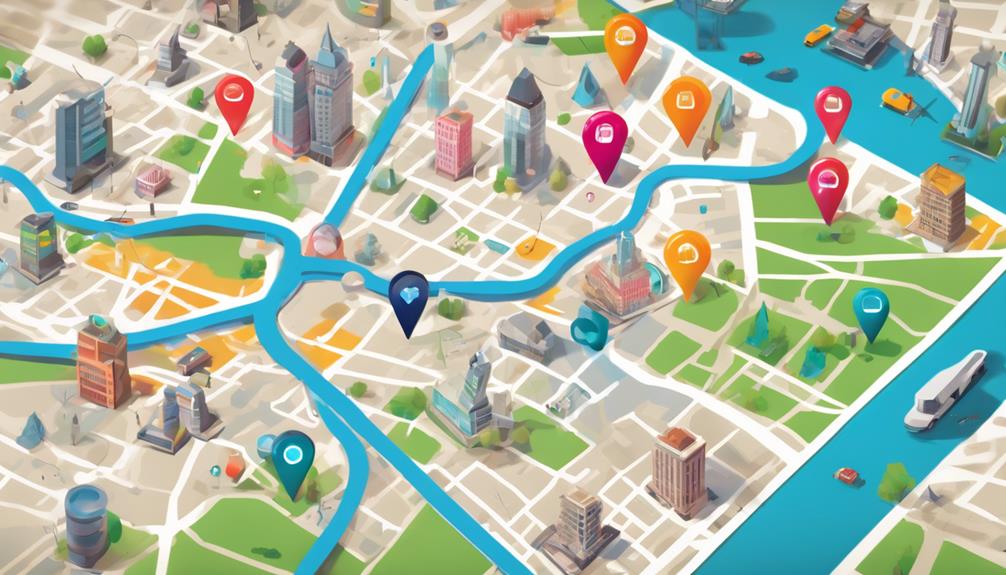When you're working to improve local SEO, you must consider content strategies that truly resonate with your community. It's more than just sprinkling local keywords throughout your site; it's about creating meaningful connections. Imagine the impact of engaging with community events or encouraging locals to contribute to your content. These efforts not only boost visibility but also foster trust and loyalty. How do you ensure your business stands out in a sea of local competitors? The key lies in understanding your local audience's needs and crafting content that speaks directly to them.
Understand Your Local Audience
How well do you really know your local audience? To master local SEO, it's crucial to dive deep into understanding who they're and what they want. Start by analyzing demographic data—age, gender, income, and education level. Utilize tools like Google Analytics and Facebook Insights to gather this data. This will help you identify patterns and trends crucial for tailoring your content strategy.
Next, focus on keyword research. Use tools like Google Keyword Planner or SEMrush to discover what local search terms your audience uses. Pay close attention to long-tail keywords, as these often reflect specific local needs and intentions. For instance, instead of targeting "coffee shops," consider "best coffee shops in [Your City]." This specificity aligns with user intent and improves your search rankings.
Engage with your community both online and offline. Analyze feedback on social media and reviews to gauge local sentiment. Conduct surveys and polls to obtain direct insights.
This qualitative data complements your quantitative analysis, providing a holistic view of your audience. By combining these insights, you can create content that resonates, drives engagement, and ultimately boosts your local SEO performance.
Optimize Google My Business
To elevate your local SEO, optimize your Google My Business (GMB) profile with precision. Start by ensuring your business name, address, and phone number (NAP) are consistent across all platforms. Inconsistent NAP data can confuse search engines and potential customers.
Next, select the most relevant primary and secondary categories that accurately describe your business. This helps Google understand your services, boosting your visibility in local searches.
Include high-quality images and ensure they're named with keyword-rich file names. According to BrightLocal, businesses with photos receive 42% more requests for directions and 35% more click-throughs to their websites.
Engage with customers by responding to reviews promptly and professionally. Positive interactions can enhance your reputation and influence ranking factors.
Utilize GMB posts to share updates, promotions, or events. These posts can increase engagement and provide additional keyword opportunities.
Also, enable the messaging feature, allowing potential customers to contact you directly, which can improve customer service metrics.
Lastly, analyze GMB Insights to track performance. By monitoring customer actions and search queries, you can refine your local SEO strategy, ensuring it's data-driven and continuously optimized for success.
Create Location-Based Content

To effectively boost your local search rankings, focus on creating content that utilizes local keywords and highlights community events.
Analyze local search trends and integrate relevant keywords into your content to capture targeted traffic.
Additionally, showcasing community events can enhance engagement and reinforce your business's local presence.
Utilize Local Keywords
Harnessing the power of local keywords is crucial for improving your business's visibility in search engine results within your community. By strategically selecting and incorporating these keywords into your content, you ensure your business appears prominently when users search for services or products in your area.
You need to analyze search volume data to identify which local keywords are most relevant and frequently used by potential customers.
Start by creating location-based content that resonates with the needs and interests of your local audience. Use local keywords naturally throughout your website, blog posts, and social media content. This targeted approach not only enhances SEO but also builds a connection with your community.
To effectively utilize local keywords, consider these strategies:
- Research local search trends: Use tools like Google Trends to understand what your community searches for.
- Incorporate geo-specific terms: Reference neighborhoods, landmarks, and local slang.
- Optimize meta tags and titles: Include local keywords in your meta descriptions and page titles.
- Engage in local link building: Partner with local businesses for backlinks.
- Leverage customer reviews: Encourage reviews that mention your location to boost relevance.
Highlight Community Events
In the realm of local SEO, highlighting community events serves as a pivotal strategy for creating location-based content that engages your audience. By focusing on local events, you can boost your search engine rankings and draw more localized traffic.
Data suggests that 46% of all Google searches seek local information, so integrating events like fairs, festivals, or charity runs into your content can significantly enhance your visibility.
To capitalize on this, craft articles or blog posts that detail upcoming community events. Use keywords like "events in [your city]" or "local happenings" to ensure your content aligns with common search queries. This targeted approach also helps build relationships with your audience by showcasing your involvement in the community.
Utilize data-driven insights to further optimize your content. Analyze which events historically generate the most interest, and align your content strategy accordingly. Incorporating user-generated content, such as photos or reviews from past events, can also add authenticity and drive engagement.
Don't forget to promote your event-focused content on social media platforms to reach a broader audience. By strategically highlighting community events, you position your brand as a local authority, ultimately driving local SEO success.
Leverage User-Generated Content
Many businesses underestimate the power of user-generated content (UGC) in boosting local SEO efforts. UGC is a goldmine for increasing local visibility and engagement. By leveraging customer reviews, testimonials, and community interactions, you can improve your local search rankings.
Search engines prioritize fresh, authentic content, and UGC provides just that. It helps you build trust and credibility in the eyes of potential customers, which translates into higher conversion rates.
To effectively utilize UGC, consider these strategies:
- Encourage Reviews: Prompt customers to leave reviews on Google My Business and other platforms. Respond to feedback to show you value their input.
- Feature User Photos: Showcase customer photos of your products or services on your website and social media. This adds authenticity and relatability.
- Host Contests: Run photo or video contests encouraging users to share their experiences. This generates buzz and more content.
- Create Hashtags: Develop branded hashtags to encourage customers to share their stories. This makes tracking and engagement easier.
- Integrate Testimonials: Use customer testimonials prominently on your website to build trust and credibility.
UGC isn't just content—it's a powerful local SEO tool that enhances your brand's online presence.
Promote Local Events and News

When it comes to boosting your local SEO, promoting local events and news can make a significant impact. This strategy not only enhances your relevance in local search queries but also increases your visibility in the community. By sharing timely information about local happenings, you align your business with the interests of your audience.
According to a study by BrightLocal, 86% of consumers use the internet to find a local business, highlighting the importance of local engagement.
You should focus on integrating keywords related to local events and news in your content. This technique helps search engines associate your site with local searches. For instance, if a popular festival is happening nearby, write a blog post or create a social media update about it, using relevant keywords like "festival in [Your City]".
Additionally, analyze which events generate the most buzz and tailor your content strategy accordingly. Google Trends can be a valuable tool for identifying popular local search terms.
Build Local Backlinks
To enhance your local SEO, consider the powerful strategy of building local backlinks. Backlinks from reputable local sources boost your site's authority and can significantly improve your local search rankings.
Start by identifying potential backlink opportunities within your community. Analyze which local businesses, directories, or organizations could link back to your site. Local backlinks not only drive organic traffic but also increase your brand's visibility in your area.
Here's how you can effectively build local backlinks:
- Partner with Local Businesses: Collaborate for mutual backlinks, like guest blogs or joint promotions.
- Engage with Local Media: Get featured in local news outlets by sharing press releases or newsworthy stories.
- Sponsor Local Events: Sponsorships often come with backlink opportunities on event websites.
- Join Local Directories: Ensure your business is listed in local online directories, boosting link profiles.
- Leverage Testimonials: Provide testimonials for local businesses in exchange for a backlink.
Data-driven analysis shows that quality local backlinks can enhance your domain authority, resulting in improved rankings.
Use tools like Google Analytics to track traffic from these links. Building local backlinks is a strategic move that can maximize your local SEO efforts, ultimately driving more customers to your business.


Leave a Reply